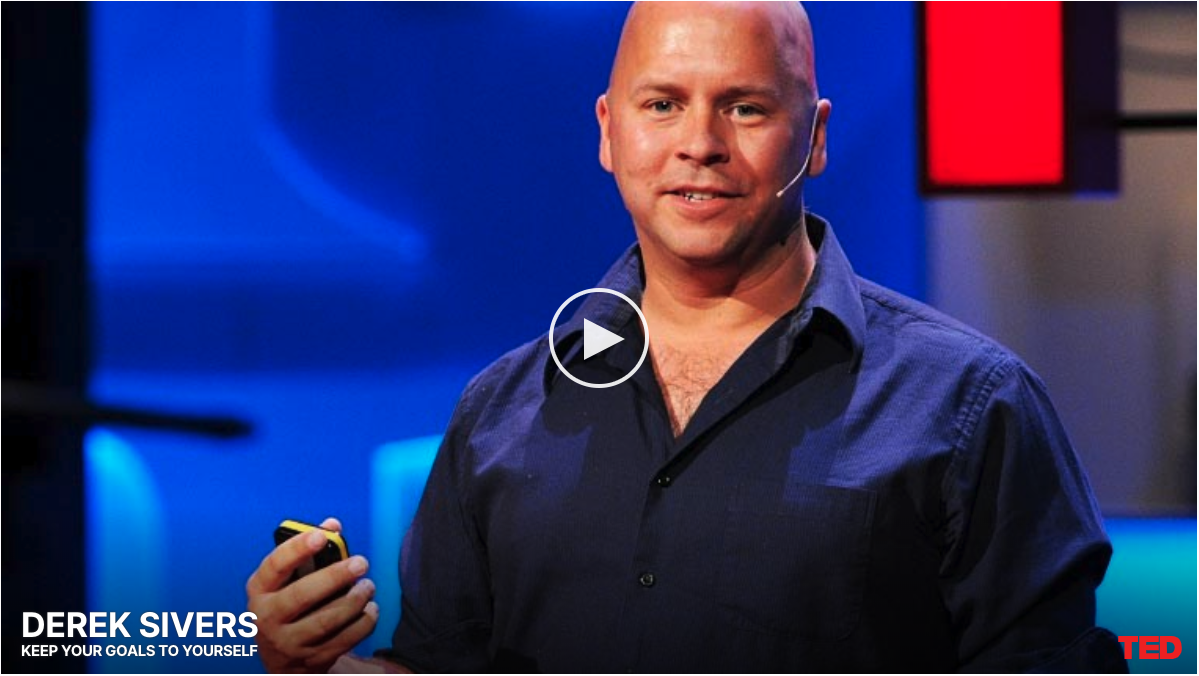
Genetic Testing for Kids: Is It a Good Idea?
5 de fevereiro de 2020
WHERE DOES FAT GO WHEN YOU LOSE WEIGHT?
12 de fevereiro de 2020Everyone, please think of your biggest personal goal. For real – you can take a second. You’ve got to feel this to learn it. Take a few seconds and think of your personal biggest goal, okay? Imagine deciding right now that you’re going to do it. Imagine telling someone that you meet today what you’re going to do. Imagine their congratulations, and their high image of you. Doesn’t it feel good to say it out loud? Don’t you feel one step closer already, like it’s already becoming part of your identity?
Well, bad news: you should have kept your mouth shut, because that good feeling now will make you less likely to do it. The repeated psychology tests have proven that telling someone your goal makes it less likely to happen. Any time you have a goal, there are some steps that need to be done, some work that needs to be done in order to achieve it. Ideally you would not be satisfied until you’d actually done the work. But when you tell someone your goal and they acknowledge it, psychologists have found that it’s called a “social reality.” The mind is kind of tricked into feeling that it’s already done. And then because you’ve felt that satisfaction, you’re less motivated to do the actual hard work necessary.
So this goes against conventional wisdom that we should tell our friends our goals, right? So they hold us to it.
So, let’s look at the proof. 1926: Kurt Lewin, founder of social psychology, called this “substitution.”1933: Wera Mahler found when it was acknowledged by others, it felt real in the mind. 1982, Peter Gollwitzer wrote a whole book about this, and in 2009, he did some new tests that were published.
It goes like this: 163 people across four separate tests. Everyone wrote down their personal goal. Then half of the man announced their commitment to this goal to the room, and half didn’t. Then everyone was given 45 minutes of work that would directly lead them towards their goal, but they were told that they could stop at any time. Now, those who kept their mouths shut worked the entire 45 minutes on average, and when asked afterward, said that they felt that they had a long way to go still to achieve their goal. But those who had announced it quit after only 33 minutes, on average, and when asked afterward, said that they felt much closer to achieving their goal.
So if this is true, what can we do? Well, you could resist the temptation to announce your goal. You can delay the gratification that the social acknowledgment brings, and you can understand that your mind mistakes the talking for the doing. But if you do need to talk about something, you can state it in a way that gives you no satisfaction, such as, “I really want to run this marathon, so I need to train five times a week and kick my ass if I don’t, okay?”
So audience, next time you’re tempted to tell someone your goal, what will you say?
Exactly! Well done.
Texto em Português:
Todos, por favor, pensem em seus maiores objetivos pessoais. De verdade. Pensem por um segundo. Precisam sentir para aprender. Levem alguns segundos e pensem em seu maior objetivo pessoal. Imaginem que estão decidindo agora mesmo que vão realizá-lo. Imaginem que contarão a alguém hoje o que farão. Imaginem os elogios deles e a boa impressão que terão de vocês. Não é agradável falar disso em voz alta? Não sentem que já estão um passo mais próximos, como se já se tornasse parte da sua identidade?
Pois bem, má notícia: deveriam ter ficado de boca fechada, porque aquele sentimento agradável ,torna-o menos propício a realizá-lo. Repetidamente, testes psicológicos provaram que contar a alguém a sua meta torna sua realização menos provável. Sempre que tiverem uma meta, há alguns passos a serem tomados, alguns trabalhos a serem feitos para realizá-la. Idealmente, vocês não ficariam satisfeitos até que tivessem feito o trabalho. Mas quando contam sua meta a alguém, e eles a reconhecem, psicólogos descobriram que isso se chama “realidade social”. É como se a mente fosse iludida a sentir que já está feito. E então, já que sentiram essa satisfação, ficam menos motivados a realizar o trabalho duro real necessário. Isso contradiz a sabedoria convencional de que deveríamos contar nossas metas a nossos amigos para que eles nos mantenham focados.
Então, vamos olhar as evidências. 1926, Kurt Lewin, fundador da psicologia social, chamou isso de “substituição”. 1922, Vera Mahler descobriu, quando algo era reconhecido pelos outros, ele parecia real na mente. 1982, Peter Gollwitzer escreveu um livro inteiro sobre isso, e em 2009, ele realizou alguns novos testes que foram publicados.
Foi assim: 163 pessoas através de quatro testes separados — cada um escreveu sua meta pessoal. Metade anunciou à sala seus compromissos com as metas, e metade não anunciou. E tiveram 45 minutos para fazer um trabalho que os levaria diretamente à realização das metas, mas lhes disseram que poderiam parar a qualquer momento. Aqueles que ficaram com as bocas fechadas trabalharam todos os 45 minutos, em média, e quando lhes perguntaram depois, disseram que sentiam ainda estar longe de atingirem suas metas. Mas aqueles que tinham anunciado desistiram após apenas 33 minutos, em média, e quando lhes perguntaram depois, disseram que se sentiam bem mais próximos de atingir suas metas.
Então, se isso for verdade, o que podemos fazer? Bem, poderíamos resistir à tentação de anunciar nossas metas. Podemos diferir a recompensa que o reconhecimento social proporciona. E podemos entender que nossas mentes confundem o falar com o fazer. Mas se precisarmos mesmo falar sobre alguma coisa, podemos falar de modo que não nos proporcione satisfação, algo como: “Eu quero mesmo correr esta maratona, então preciso treinar cinco vezes por semana, e pode me dar uns tapas se eu não fizer isso, certo?”
Portanto, da próxima vez que quiserem contar suas metas a alguém, o que vão dizer? Exatamente. Muito bem.





